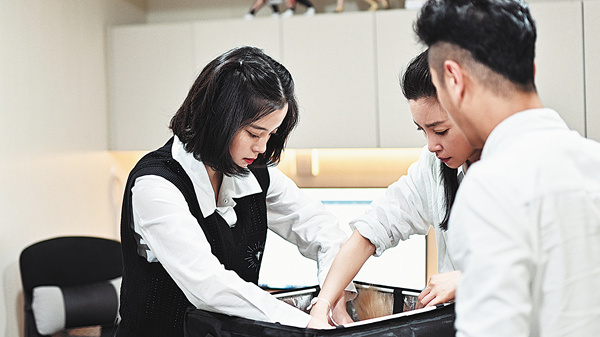

"People's pursuits can be diverse, and they can't be OK with just handling the pressure of life," Zhao says. "People also need to chase their childhood dream and try to achieve psychological goals."
In this show, an amateur architect tries to realize his romantic idea in Lijiang, Yunnan province, by designing and building houses inspired by cartoons and "his dreams". He even wants to make a house "fly" using balloons, like in the animation Up.
In another episode, the crew follows a group of street artists creating graffiti in Wuhan, Hubei province, who some may view as rebellious, but, in Zhao's opinion, are just down to earth.
"They paint about life in the backstreets of their home city," the director says. "The form is cool, but what they want to express is close to our everyday life. That's the realistic representation of Chinese people."
To reflect the diversity of China from various angles, Zhao's lens focused on people from different parts of the country. Without complicated editing and elaborate scripts, Zhao says he wants to show a real image of the celebrities, who also represent a group of people among the general public.
Consequently, in this program, no particular theme is "tailored "for certain celebrities because of their public personas.
"They're not always the shining idols they are perceived to be," he says. "Sometimes, when faced with the unfamiliar, they also become timid. By being real and sincere, they're resonating with us."
The director adds that the celebrities also approach the lives of ordinary people from an equal perspective.
"Ordinary people in this show also won't treat these celebrities like stars," Zhao says. "People won't look up to them. Instead, they chat in a casual and natural way. They don't always agree with what the celebrities say and they also express their own opinions on life."
Such mutual respect and willingness to listen to each other, as shown through the program, is needed in modern society, the director says.
"Online, people can easily get divided, and they tend to say 'you're not my group of people', and they 'attack' each other," Zhao says. "But our society needs some consensus and coherence. Only then can we advance together."
Though relatively slow, rhythmically, in many ways, The Vicinity is like a manifesto for a fast-changing world. As the pandemic urges many young people, who previously only focused on their fast-paced lifestyles, to consider some distant, but serious, themes like life and death, this reality show may also linger in their minds as it touches on this topic.
Actress Liu Mintao helps a couple to run their hostel in a village in Sichuan province, while at the same time the wife is diagnosed with a terminal illness. The congenital neural system disease brings uncertainty, and while her time is short, doctors could not tell her exactly how long she has left to live. In another episode, actress Li Bingbing joins morticians who work with animals, helping people give their beloved pets a dignified farewell.
"These people remind us to consider many issues that we usually wouldn't think about," Zhao says. "But it's not a bad thing to think about life and death. We realize that we need to fix our deeds, or our relationships with family before it's too late."